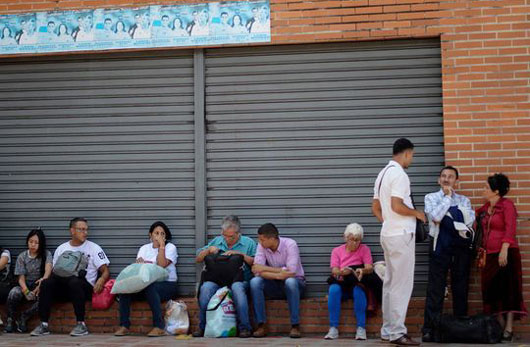by WorldTribune Staff, December 15, 2017
Although the socialist government of Nicolas Maduro has stopped publishing official numbers, at least 1.1 million people have fled Venezuela amid a devastating humanitarian crisis according to officials in neighboring countires.
The situation in Venezuela seems to worsen by the day, with severe shortages of food and medicine, runaway inflation and one of the worst homicide rates in the world.

“Leaving was tough, but staying would have been tougher,” Andrea Sequiera, 29, told USA Today.
Sequiera fled to Peru with her husband Luis, 31, and 8-year-old son Fabian. “We know lots of people who would like to get out of Venezuela but can’t afford the ticket.”
Immigration agencies from Mexico to Argentina report huge increases in the numbers of Venezuelans arriving in their nations.
Most of those leaving Venezuela at this point are heading to Latin American countries as they can’t afford the airfare to the United States or fear being turned away due to President Donald Trump’s immigration policies, analysts say.
Peru introduced a special temporary visa in February for those fleeing the humanitarian crisis in Venezuela. Nearly 30,000 Venezuelans have applied for the visa, which includes a temporary work permit.
Desperate Venezuelan immigrants are looking for any way possible to support their families, said Garrinzon Gonzalez, who runs the Venezuelan Union in Peru.
“There’s nothing to buy in the shops in Venezuela now anyway,” he said. “Here you can have a roof over your head and stable work very quickly after you arrive.”
The influx of Venezuelans has caused tension in some Latin American countries. In Panama, the new arrivals are competing for jobs with the country’s residents and that has stoked nationalistic sentiment, said Harold Trinkunas, an international security analyst at Stanford University who grew up in Venezuela. Panama responded by tightening its visa requirements.
The Sequieras told USA Today they arrived in Peru after a six-day bus trip from their native Valencia, Venezuela’s third-largest city. They said they became desperate as their wages – Andrea’s pay as a human resources coordinator and her husband’s at Empresas Polar, Venezuela’s largest food and beverage company – became increasingly worthless.
“The worst thing is not being able to feed him,” she said nodding toward their son.
“We want to make friends and have a good life here,” Andrea Sequiera said. “We would like to go back, but right now we are focused on just rebuilding our lives.”
Subscribe to Geostrategy-Direct __________ Support Free Press Foundation
